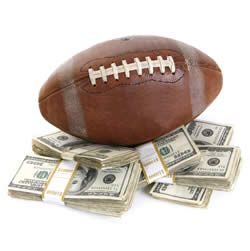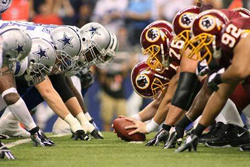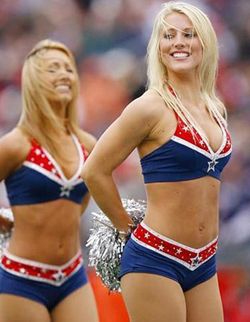Football Season Can Pay Off for Savvy Bettor
By Lenny Palumbo
 |
 |
| Sports fans (below) can bet and win, if they follow Lenny’s advice... |
 |
 |
 |
It’s that time of year again. The nights are getting shorter, the leaves are ready to fall, and football is back. That means there are opportunities awaiting the astute sports investor.
Last spring we touched on the finer points of wagering on baseball. Now that fall has finally arrived, we’ll take a look at some essential strategies that will help those so inclined to strike gridiron gold this season.
Unlike baseball, which is bet predominantly on the money line, football uses a point spread to balance the scales between the good and not so good. A dime line is used in most instances, meaning a bet on any team to win $100 requires one to risk $110. The $10 is the bookmaker’s commission or “vigorish,” for taking whatever bet you want to make.
The vigorish forces players to win 52.38% of their wagers just to break even. Most gamblers are unable to overcome this “house edge” and end up helping their bookmaker pay for his new Cadillac or trip to Vegas.
It’s important to remember that bookmakers and sportsbooks aren’t gamblers; they’re brokers. Ideally, they want an even amount of money bet on both teams, ensuring them a profit. The vigorish is how bookies make money regardless of who wins.
As is the case in all sports, football bettors tend to bet favorites more than underdogs. The reasons for this are perhaps better explained by a psychologist. What’s important is that oddsmakers are well aware of this truism and factor it into the point spread, forcing frontrunners to pay a premium for their preference. This makes underdogs the better value, especially in the NFL where the disparity in talent between the league’s best and worst teams in very small.
In college football, some selectivity is required to find the most profitable underdogs. Point spreads as high as 35 or 40 points are not unusual in Division 1 college football because there are so many mismatches. (The UB Bulls are getting 38 points this week in their road opener at Georgia.) Betting on longshots is not advisable, because teams spotted five or six touchdowns have virtually no chance of winning the game outright. When shopping for underdogs, it’s best to find teams that are more than capable of pulling the “upset.”
Since 1997 there have been 595 college teams getting 31 points or more. Of those teams only 6, or 1% have won outright. Underdogs, however, getting between 3½-7 points have won straight up 35% of the time, and dogs getting a field goal or less have won 48% of the time. Obviously, these underdogs are better plays than those in the higher price ranges and should receive most of your attention.
Unlike pro football, college handicappers can find opportunities betting favorites in certain situations. As has always been the case, football is still a game won in the trenches. Favorites that rush the ball well versus teams that are soft against the run are excellent bets. The ground and pound approach opens up the passing game and often results in lopsided final scores. Pay careful attention to each team’s rushing offense and defense before making a play on a favorite.
In the NFL you’d be best served by betting almost exclusively on underdogs for the reason previously mentioned. The talent differential between the first and last place teams in the league is not significant. That’s why it’s unusual to see pro point spread of 14 points or more.
It has been said that the best handicapper in the world will turn out to be a PhD in psychology with a minor in math, not a PhD in math with a minor in psychology. What this means is that those more in tune with human nature and the natural tendencies of athletes are more likely to find winners than those who spend countless hours sifting through statistical data.
Playing a football game is an emotional experience. An entire week of preparation focusing on a single opponent is the build up for three hours of physical violence. An especially emotional victory, or defeat, is likely to have lingering psychological effects on a team and its players, affecting their performance the following week.
Not all wins and losses are the same. A comeback win in overtime against a conference or division rival is not the same as beating a non-conference foe with a poor record. Favorites coming off emotional victories are good teams to bet against the following week, especially if they’re playing a non-division opponent. It’s very difficult, if not impossible, to bring the same commitment and intensity to preparing for a team you’re supposed to beat, especially when players have been listening all week to the media telling them how great they are. Situations such as these are referred to as the “letdown” effect and result in many upsets.
Upsets happen frequently because, regardless of the reasons, the favorite comes into the contest unprepared to give 100 percent. It might be because of the “letdown” effect, off the field distractions or the “look ahead” factor.
The “look ahead” factor occurs when a favorite is playing a non-conference or non-division opponent with a big game versus a rival coming the following week. Some teams “look ahead” to the big game and don’t focus or prepare sufficiently for the underdog everyone expects them to beat. A hungry underdog, resentful of the disrespect from their opponent and the media, often catches the favorite “looking ahead” and pulls the upset.
In other words, we’re not looking for teams to bet on as much as situations to make plays. When the right psychological situation presents itself, underdogs in pro and college football are solid moneymaking opportunities.
Also, it is essential to be mindful of “key numbers” involved in football betting. These key numbers are 3, 4, 6, 7, 10, 13 and 14. Because of increments in which football is scored, these key numbers are most likely to be the point differential between winning and losing teams. More games are decided by 3 points (16%) than any other number. That means a line move off 3 is considerably more significant than a line move off 5. Few games are decided by 5 points.
Line moves occur when bookies and sportsbooks get disproportionate action on one team. Adjusting the line helps them balance their books and not become gamblers themselves. Line moves toward favorites are usually precipitated by amateurs while line moves toward underdogs are usually the work of sharps or wise guys.
Betting against public opinion is the best place to start. In most aspects of life, public opinion is usually wrong. If the public could accurately predict the outcome of football games, there would be nobody left to take their bets. Find out which teams the public is betting heavily and look for reasons to wager on the other side.
Those who like to bet totals or over/unders should keep in mind that most people like to bet overs and get the short end of the stick from the oddsmaker. Consequently, under plays are the better value.
The last and most important aspect of football sports investing is money management. Most amateurs bet too much per game and easily fall prey to losing streaks. The law of probability makes winning and losing streaks inevitable. A gambler betting too much per game who experiences an early losing streak usually goes bust without having a chance to cash in on the winning streak to follow. Betting a small percentage of one’s bankroll, no more than 1 or 2%, is a safe way to avoid disaster. For example, if you’re bankroll is $100,000 you shouldn’t be wagering more than $1000 or $2000 per game. The slow and steady approach is the best way to stay in the game and turn a profit.
The skillful, disciplined sports investor who incorporates these strategies into a coherent and consistent game plan is well on the way to making the fall season his most favorite and profitable time of the year.